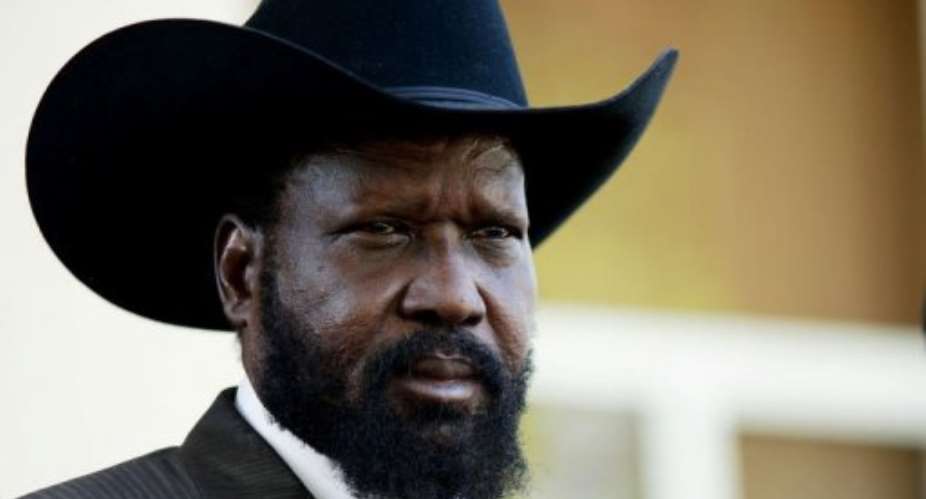BEIJING (AFP) - South Sudan's leader kicks off a visit to Beijing on Tuesday with the hosts keen to defuse a raging dispute between the fledgling nation and neighbouring Sudan that threatens Chinese oil supplies.
South Sudan President Salva Kiir will meet his Chinese counterpart Hu Jintao later in the day for talks likely to focus on simmering tensions that saw an outbreak of open hostilities between South Sudan and the nation it split from.
China has been a key ally and the largest economic partner of diplomatically isolated Sudan, helping it become a major oil exporter and opening a new supply line for China's voracious energy needs.
But the south's split from Sudan in July 2011 and recent clashes have forced a Chinese juggling act to maintain support for Khartoum while not alienating the south, the world's newest nation and source of most of former Sudan's oil.
Beijing has called for an end to weeks of border hostilities that saw the South seize Sudan's most important oil field in the Heglig area on April 10 for 10 days, triggering widespread international criticism.
The two countries have engaged in sporadic fighting along their common oil-rich border in recent months, prompting international concerns about the possibility of all-out war.
Juba says Khartoum had been launching attacks on southern areas from Heglig, whose oil production was being run by Petrodar, a Chinese-Malaysian joint venture with Khartoum.
Sudanese President Omar al-Bashir has threatened to crush the "insect" government of South Sudan, which provided some five percent of China's oil until it shut down production in January.
Landlocked South Sudan had been using a Sudan pipeline and port to export its crude, but imposed the shutdown in a dispute over fees for the trans-shipments.
On Tuesday Beijing expressed concern over the recent escalation of tensions, which have seen Sudan launch fresh air raids against the South, drawing condemnation from the United Nations, United States and France.
"We hope the two countries can solve their dispute through dialogue and consultation and do not take actions that may escalate the tensions," said foreign ministry spokesman Liu Weimin
"Oil is the common economic lifeline of the two countries. Ensuring sustainable oil production serves the common interests of the two countries as well as the interests of Chinese oil companies and their partners."
Li Guangyi, a professor at the Institute of African Studies at central China's University of Xiangtan, said oil will be the "main topic" of Kiir's visit, noting China is the biggest buyer of Sudanese oil.
Kiir will plead his nation's case to Beijing, Li said, but added China was unlikely to take sides and will continue pushing for dialogue.
"Fighting is not beneficial to (Sudan and South Sudan), but neither is it beneficial for China," Li said.
The current fighting is the worst since South Sudan won independence after a 1983-2005 civil war in which about two million people died.
Sudan accuses the South of supporting anti-government rebels from its conflict-hit western region of Darfur as well as those fighting in South Kordofan state and Blue Nile.
Clashes have continued in recent days and Jonathan Holslag, of the Brussels Institute of Contemporary China Studies, said the situation showed "the limitation of China's traditional fence-sitting".
"With most of the oil in South Sudan and the best political partnership in the north, Beijing is in a hugely difficult situation and has not much leverage over Juba," he said.
Kiir, who arrived late on Monday, was due to meet Premier Wen Jiabao on Wednesday. He is due to leave China on Saturday.





 We’re disappointed over gov’t’s lacklustre attitude to negotiations of our condi...
We’re disappointed over gov’t’s lacklustre attitude to negotiations of our condi...
 No more Buffer Stock as Mahama promises to decentralise SHS food supply
No more Buffer Stock as Mahama promises to decentralise SHS food supply
 NSS urges President Akufo-Addo to sign National Service Bill into law
NSS urges President Akufo-Addo to sign National Service Bill into law
 You're lying, your 7-11pm dumsor attributed to overloaded transformers is false ...
You're lying, your 7-11pm dumsor attributed to overloaded transformers is false ...
 Consult Council of State on anti-gay bill – Mahama advises Akufo-Addo
Consult Council of State on anti-gay bill – Mahama advises Akufo-Addo
 Transport Ministry has no power to determine fares – COPEC
Transport Ministry has no power to determine fares – COPEC
 Brace yourselves for more economic hardship – Prof Adei to Ghanaians
Brace yourselves for more economic hardship – Prof Adei to Ghanaians
 Any government depending on IMF is likely to fail – Grand Coalition
Any government depending on IMF is likely to fail – Grand Coalition
 Ghana risks losing premium cocoa position due to galamsey – COCOBOD laments
Ghana risks losing premium cocoa position due to galamsey – COCOBOD laments
 Akufo-Addo launches NSS policy document to tackle under-utilisation of service p...
Akufo-Addo launches NSS policy document to tackle under-utilisation of service p...
